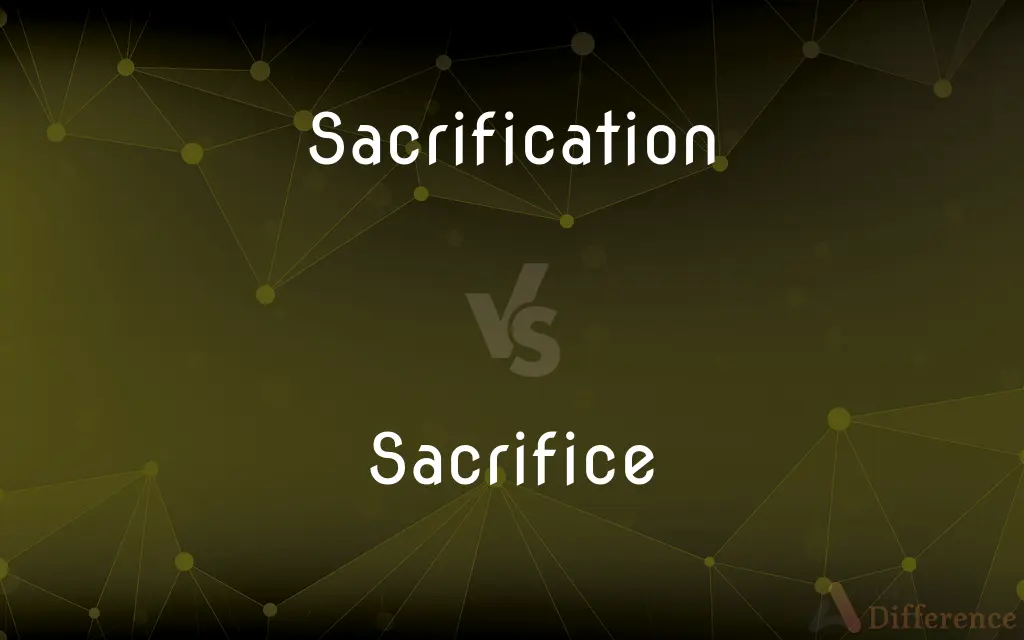Sacrification vs. Sacrifice — What's the Difference?
By Maham Liaqat & Urooj Arif — Updated on May 21, 2024
Sacrification refers to the process of cutting or scraping the skin as a form of body modification, sacrifice is the act of giving up something valuable for a higher purpose such as a religious offering or personal loss for the benefit of others.

Difference Between Sacrification and Sacrifice
Table of Contents
ADVERTISEMENT
Key Differences
Sacrification involves intentionally inflicting cuts or scrapes on the skin to create permanent scars, often for cultural, aesthetic, or ritualistic reasons. This practice is common in some traditional societies where the resulting scars serve as symbols of identity, status, or rites of passage. Sacrifice, in contrast, is the act of offering something precious or giving up something valuable for a significant cause. It can take various forms, such as religious offerings to deities, personal sacrifices for the well-being of others, or symbolic acts of devotion and commitment.
Sacrification is a physical act with visible results on the body. It is often associated with specific cultural practices and carries deep symbolic meaning within those contexts. Sacrifice involves a broader range of actions and intentions. It can be a deeply personal act, such as sacrificing time, comfort, or personal desires for the benefit of others.
Sacrification's primary focus is on the physical alteration of the body, whereas sacrifice emphasizes the act of giving up or offering something valuable. While sacrification is more about cultural and aesthetic expression, sacrifice often involves a moral or spiritual dimension, highlighting the giver's commitment or devotion.
Both concepts are rooted in historical and cultural practices, but they differ significantly in their applications and implications. Sacrification is specific to bodily modification and cultural rituals, while sacrifice spans a wide range of acts motivated by various purposes, from religious devotion to altruistic acts.
Comparison Chart
Definition
Cutting or scraping the skin
Offering something valuable
ADVERTISEMENT
Context
Body modification, rituals
Religious, personal, or symbolic acts
Physical Act
Yes, involves skin modification
Not necessarily, can be intangible
Purpose
Cultural, aesthetic, symbolic
Devotion, altruism, religious offering
Visibility
Results in permanent scars
May not have visible outcomes
Cultural Significance
Traditional practices
Broadly practiced across cultures
Compare with Definitions
Sacrification
The act of cutting or scraping the skin to create scars for body modification.
The tribal sacrification patterns are unique to their cultural heritage.
Sacrifice
Sacrifice is the offering of material possessions or the lives of animals or humans to a deity as an act of propitiation or worship. Evidence of ritual animal sacrifice has been seen at least since ancient Hebrew and Greeks, and possibly existed before that.
Sacrification
Creating decorative scars as a form of aesthetic expression.
She chose sacrification to commemorate her cultural roots.
Sacrifice
The act of offering something to a deity in propitiation or homage, especially the ritual slaughter of an animal or a person.
Sacrification
A traditional practice involving skin alteration for symbolic purposes.
Sacrification is part of the initiation rites in some African tribes.
Sacrifice
A victim offered in this way.
Sacrification
A ritualistic act of marking the body.
The sacrification ceremony marked his transition to adulthood.
Sacrifice
The act of giving up something highly valued for the sake of something else considered to have a greater value or claim
Social activism often involves tremendous sacrifice.
Sacrification
Body modification involving intentional scarring.
Sacrification is seen as a rite of passage in their community.
Sacrifice
Something given up in this way.
Sacrification
The act of a sacrifice
Sacrifice
Relinquishment of something at less than its presumed value.
Sacrifice
Something so relinquished.
Sacrifice
A loss so sustained.
Sacrifice
(Baseball) A sacrifice bunt or sacrifice fly.
Sacrifice
To offer as a sacrifice to a deity.
Sacrifice
To give up (one thing) for another thing considered to be of greater value.
Sacrifice
To sell or give away at a loss.
Sacrifice
To kill (an animal) for purposes of scientific research or experimentation.
Sacrifice
To offer a sacrifice
The Greek warriors sacrificed to their gods.
Sacrifice
To make a sacrifice
Parents sacrificing for their children.
Sacrifice
(Baseball) To make a sacrifice bunt or sacrifice fly.
Sacrifice
(ambitransitive) To offer (something) as a gift to a deity.
Sacrifice
(transitive) To give away (something valuable) to get at least a possibility of gaining something else of value (such as self-respect, trust, love, freedom, prosperity), or to avoid an even greater loss.
Sacrifice
(transitive) To trade (a value of higher worth) for something of lesser worth in order to gain something else valued more, such as an ally or business relationship, or to avoid an even greater loss; to sell without profit to gain something other than money.
Sacrifice
To intentionally give up (a piece) in order to improve one’s position on the board.
Sacrifice
To advance (a runner on base) by batting the ball so it can be fielded, placing the batter out, but with insufficient time to put the runner out.
Sacrifice
To sell at a price less than the cost or actual value.
Sacrifice
To destroy; to kill.
Sacrifice
(medicine) To kill a test animal for autopsy.
Sacrifice
The offering of anything to a god; a consecratory rite.
Sacrifice
The destruction or surrender of anything for the sake of something else; the devotion of something desirable to something higher, or to a calling deemed more pressing.
The sacrifice of one's spare time in order to volunteer
Sacrifice
(baseball) A play in which the batter is intentionally out so that one or more runners can advance around the bases.
Sacrifice
Something sacrificed.
Sacrifice
A loss of profit.
Sacrifice
A sale at a price less than the cost or the actual value.
Sacrifice
The offering of anything to God, or to a god; consecratory rite.
Great pomp, and sacrifice, and praises loud,To Dagon.
Sacrifice
Anything consecrated and offered to God, or to a divinity; an immolated victim, or an offering of any kind, laid upon an altar, or otherwise presented in the way of religious thanksgiving, atonement, or conciliation.
Moloch, horrid king, besmeared with bloodOf human sacrifice.
My life, if thou preserv'st my life,Thy sacrifice shall be.
Sacrifice
Destruction or surrender of anything for the sake of something else; devotion of some desirable object in behalf of a higher object, or to a claim deemed more pressing; hence, also, the thing so devoted or given up; as, the sacrifice of interest to pleasure, or of pleasure to interest.
Sacrifice
A sale at a price less than the cost or the actual value.
Sacrifice
To make an offering of; to consecrate or present to a divinity by way of expiation or propitiation, or as a token acknowledgment or thanksgiving; to immolate on the altar of God, in order to atone for sin, to procure favor, or to express thankfulness; as, to sacrifice an ox or a sheep.
Oft sacrificing bullock, lamb, or kid.
Sacrifice
Hence, to destroy, surrender, or suffer to be lost, for the sake of obtaining something; to give up in favor of a higher or more imperative object or duty; to devote, with loss or suffering.
Condemned to sacrifice his childish yearsTo babbling ignorance, and to empty fears.
The Baronet had sacrificed a large sum . . . for the sake of . . . making this boy his heir.
Sacrifice
To destroy; to kill.
Sacrifice
To sell at a price less than the cost or the actual value.
Sacrifice
To make offerings to God, or to a deity, of things consumed on the altar; to offer sacrifice.
O teacher, some great mischief hath befallenTo that meek man, who well had sacrificed.
Sacrifice
The act of losing or surrendering something as a penalty for a mistake or fault or failure to perform etc.
Sacrifice
Personnel that are sacrificed (e.g., surrendered or lost in order to gain an objective)
Sacrifice
A loss entailed by giving up or selling something at less than its value;
He had to sell his car at a considerable sacrifice
Sacrifice
The act of killing (an animal or person) in order to propitiate a deity
Sacrifice
(sacrifice) an out that advances the base runners
Sacrifice
Endure the loss of;
He gave his life for his children
I gave two sons to the war
Sacrifice
Kill or destroy;
The animals were sacrificed after the experiment
The general had to sacrifice several soldiers to save the regiment
Sacrifice
Sell at a loss
Sacrifice
Make a sacrifice of; in religious rituals
Sacrifice
The act of offering something valuable, often for a higher purpose.
She made a great sacrifice to ensure her children's education.
Sacrifice
A religious act of offering to a deity.
The ancient ritual involved the sacrifice of animals to the gods.
Sacrifice
Giving up something important for the benefit of others.
His sacrifice of time and energy helped the project succeed.
Sacrifice
An act of self-denial or foregoing personal benefits.
Volunteers make many sacrifices to help those in need.
Sacrifice
Offering something precious as a sign of devotion or commitment.
Their sacrifice symbolizes their dedication to the cause.
Common Curiosities
What is sacrification?
Sacrification is the process of cutting or scraping the skin to create permanent scars for cultural or aesthetic reasons.
What is sacrifice?
Sacrifice is the act of giving up something valuable for a higher purpose, such as religious offerings or personal loss for others' benefit.
Is sacrification a form of body art?
Yes, sacrification can be considered a form of body art and modification.
Are sacrification and sacrifice the same?
No, sacrification involves physical skin modification, while sacrifice involves offering or giving up something valuable.
What types of sacrifices are there?
Sacrifices can be religious, personal, symbolic, or altruistic.
What are the purposes of sacrification?
Sacrification serves cultural, aesthetic, and symbolic purposes, often as part of traditional rituals.
Is sacrification common today?
Sacrification is less common today but still practiced in some cultures and by individuals seeking body modification.
Can sacrifices be religious?
Yes, sacrifices often have religious significance, such as offerings to deities.
Is sacrification always painful?
Sacrification involves cutting or scraping the skin, which can be painful.
What do sacrifices symbolize?
Sacrifices symbolize devotion, commitment, and altruism.
Can sacrifice involve giving up non-material things?
Yes, sacrifice can involve non-material aspects like time, comfort, or personal ambitions.
What is the cultural significance of sacrification?
Sacrification often signifies identity, status, or rites of passage within certain cultures.
Can sacrifice be intangible?
Yes, sacrifices can be intangible, such as sacrificing time or personal desires for a greater cause.
Why do people make sacrifices?
People make sacrifices to show devotion, support others, or fulfill religious or moral obligations.
Are there health risks with sacrification?
Yes, sacrification carries health risks such as infection and scarring.
Share Your Discovery

Previous Comparison
Jolt vs. Bolt
Next Comparison
Contact vs. TouchAuthor Spotlight
Written by
Maham LiaqatCo-written by
Urooj ArifUrooj is a skilled content writer at Ask Difference, known for her exceptional ability to simplify complex topics into engaging and informative content. With a passion for research and a flair for clear, concise writing, she consistently delivers articles that resonate with our diverse audience.












































